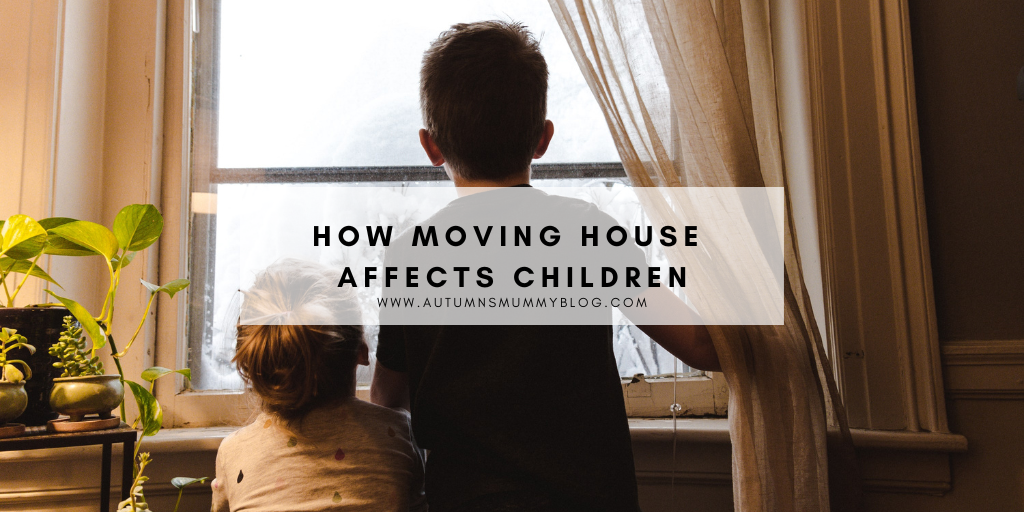Sponsored Post¦ Moving house is always going to be a stressful time. The buying process never seems to go completely smoothly and you may find yourself unable to find exactly what you want and end up compromising. Then there’s all the legal costs and the decluttering and packing. Even without all these factors to worry about, though, moving house affects our children. When we moved house in November 2020, we definitely noticed a change in our then 3 year old daughter Autumn’s behaviour. Let’s take a look at how you can expect moving home to affect your child and what you can do to help.
How moving affects children
If you think about it, your home is (hopefully) your place of safety. It’s where you can just be yourself and unwind at the end of a hard day’s work. It’s no different for children. So, in removing that and moving them somewhere they’re unfamiliar with can cause them to feel really unsettled and anxious. The older they are, the more disconcerting it’s likely to be for them. Not only that, but children are excellent at picking up on stress, which in turn can make them feel more stressed too!
It’s a good idea for them as well as your health to reduce your stress as much as possible. Get a London Removals Company (or a removals company elsewhere if you’re not in the capital) to help with some of the more stressful parts of moving, such as packing and moving everything from house to house.
How their behaviour may change
Babies and Pre-schoolers
In babies, you might notice a change in their routine and they may seem fussier than usual. The good news is, babies should settle in well within a few days.
Toddlers and pre-schoolers might find it a little more difficult. As I mentioned, my daughter was 3 when we moved house. She started twiddling and pulling her hair a lot in the lead up to us moving house. It probably didn’t help her anxiety that it was also within the first few months of the pandemic and we were also expecting another baby! We also noticed that she seemed to become a bit more clingy and needed more attention. Some children who have already been potty trained for some time can go back to wetting themselves, especially at night time. You may also notice them having more tantrums as they struggle to articulate how they’re feeling.
Primary School Children
Primary school children will find it hard to change schools and leave their old friends behind. It is expected and completely normal for them to be anxious about fitting in and making new friends. Sometimes teaching methods vary between schools, so monitor whether this is something that could also be concerning your child. Look out for signs of your child withdrawing and losing concentration on school tasks. Your child may also show other classic signs of stress, such as nail biting, struggling to fall asleep or having unsettled sleep and nightmares. For the first term at least, it would be a good idea to liaise with your child’s teacher to see how well they’re settling in so you can gage how they are when they’re not with you.
Teenagers
Life is tough for teenagers as it is, without moving house. They may be prone to depression or eating disorders as a result of losing what has been familiar to them and their friendship circle. Falling behind at school is also a possibility, so try to keep an eye on this in a way that doesn’t make them feel intimidated.
How to help your children
Babies
Luckily, babies are nice and easy. As long as they’re fed, clean, have slept and are free of wind they’re generally content little souls. If their needs are met and they’re being cuddled or played with lots, it shouldn’t take long at all for them to settle into their new home.
Toddlers, pre-schoolers and primary school children
With Autumn, we made sure that we reassured her and answered any of her questions in a really positive way. Remind them that they’ll be with you and that they’ll be safe and loved just as they are now. Talk about exciting things, like a nearby playground or their new room and how they’d like it decorated. Spend lots of time with them and discuss all the positives of moving to a new house. Perhaps you could even find a book in the library or watch a video about a child moving house.
We also found it really helped to get her as involved as possible! We told her as soon as we made the decision to sell our house and took her to see potential new houses with us. In each, we showed her which room would be hers and asked for her opinion. When we were packing things into boxes, she helped us and packed her toys up. Of course, the older the child, the more involved they can be!
Teenagers
It’s always going to be a bit trickier with teenagers. Make sure you speak to them as an adult and let them express their opinions. Even if you disagree, don’t get angry or shout at them. It’s often hard enough for teenagers to open up anyway and that will only make them clam up more. Let them know you’re there without acting like they’re a child. Seek further help if you are concerned that they’re struggling with their mental health.
Disclosure: This is a sponsored post written for M25 Group, for which I have received compensation. As always, all views and opinions are honest and my own.
